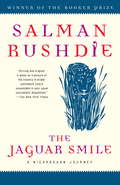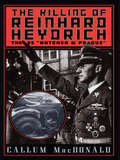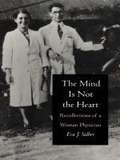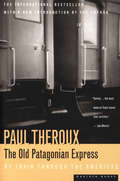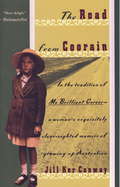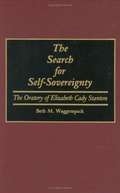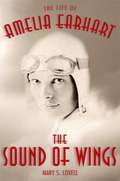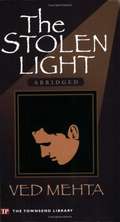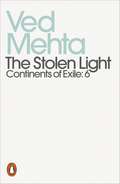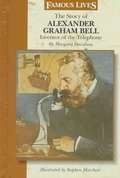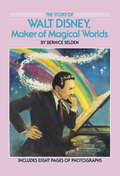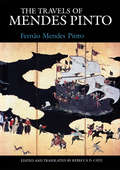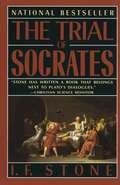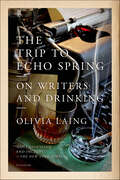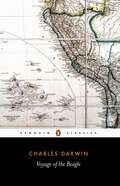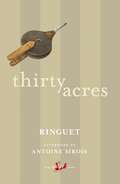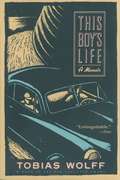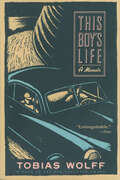- Table View
- List View
The Jaguar Smile: A Nicaraguan Journey
by Salman Rushdie“I did not go to Nicaragua intending to write a book, or, indeed, to write at all: but my encounter with the place affected me so deeply that in the end I had no choice.” So notes Salman Rushdie in his first work of nonfiction, a book as imaginative and meaningful as his acclaimed novels. In The Jaguar Smile, Rushdie paints a brilliantly sharp and haunting portrait of the people, the politics, the terrain, and the poetry of “a country in which the ancient, opposing forces of creation and destruction were in violent collision.” Recounting his travels there in 1986, in the midst of America’s behind-the-scenes war against the Sandinistas, Rushdie reveals a nation resounding to the clashes between government and individuals, history and morality.
The Killing of Reinhard Heydrich: The SS "Butcher of Prague"
by Callum MacdonaldIf anyone warranted assassination during World War II, the man to know was Reinhard Heydrich (1904?1942)?chief of the security police, rabid anti-Semite, architect of the Final Solution, ruthless over
The Long Gray Line
by Rick AtkinsonBased on the true story of Marty Maher, a humble Irish immigrant who rose through the ranks to become one of West Point's most beloved instructors. A rousing tribute to a remarkable man & his way of life.
The Mind is Not the Heart: Recollections of a Woman Physician
by Eva J. SalberAvailable for the first time in paperback, Eva Salber's The Mind Is Not the Heart (originally published in 1989), is the personal and political story of a white, Jewish, South African woman who practiced medicine for over fifty years among the impoverished--both rural and urban, black and white, in South Africa and later in the United States. Her lifelong dedication to providing health care to poor people was informed by a passionate vision of the link between social problems and medicine, accompanied by an embracing involvement with the communities in which she served. In this warm clear-eyed account, Dr. Salber presents not only her own personal journey, that of a professional woman, teacher, wife, and mother, but also the story of the people on the margins of society among whom she worked.
The Old Patagonian Express: By Train Through the Americas (Penguin Modern Classics Ser.)
by Paul TherouxThe acclaimed travel writer journeys by train across the Americas from Boston to Patagonia in this international bestselling travel memoir.Starting with a rush-hour subway ride to South Station in Boston to catch the Lake Shore Limited to Chicago, Paul Theroux takes a grand railway adventure first across the United States and then south through Mexico, Central America, and across the Andes until he winds up on the meandering Old Patagonian Express steam engine. His epic commute finally comes to a halt in a desolate land of cracked hills and thorn bushes that reaches toward Antarctica. Along the way, Theroux demonstrates how train travel can reveal &“"the social miseries and scenic splendors&” of a continent. And through his perceptive prose we learn that what matters most are the people he meets along the way, including the monologuing Mr. Thornberry in Costa Rica, the bogus priest of Cali, and the blind Jorge Luis Borges, who delights in having Theroux read Robert Louis Stevenson to him.
The Reluctant King: The Life and Reign of George VI
by Sarah BradfordComprehensive biography of the English King.
The Road from Coorain
by Jill Ker ConwayJill Ker Conway is a noted historian, specializing in the experience of women in America, and was the first woman president of Smith College.
The Savage My Kinsman
by Elisabeth ElliotIn January of 1956, the world recoiled in shock with the news. Five American missionaries had been speared to death in the Equadorian jungles by Auca Indians - reportedly the most savage tribe on earth. Years later, it became clear that what had seemed to be the tragic ending of those missionaries' dreams was only the first chapter of one of the most breathtaking missionary stories of the twentieth century. The Savage, story, in text Elisabeth Elliot's territory, tells of her interactions with the Aucas after her husband's death. She learns their language and culture and teaches them about God.
The Scent of Snowflowers: A Chronicle of Faith, Hope and Survival in War-ravaged Budapest
by R. L. KleinThe true story of a Jewish family and the Gentiles who hid and protected them during World War II in Budapest.
The Search for Self-Sovereignty: The Oratory of Elizabeth Cady Stanton
by Beth M. WaggenspackThis book is divided into two major sections. The first is a summary of the life and times of the pioneering women's-rights advocate Elizabeth Cady Stanton with an analysis of several of her most important speeches. The second section reprints some representative speeches in full.
The Snows of Yesteryear: Portraits For An Autobiography
by Gregor Von Rezzori H. F. Broch De RothermannGregor von Rezzori was born in Czernowitz, a onetime provincial capital of the Austro-Hungarian Empire that was later to be absorbed successively into Romania, the USSR, and the Ukraine--a town that was everywhere and nowhere, with a population of astonishing diversity. Growing up after World War I and the collapse of the empire, Rezzori lived in a twilit world suspended between the formalities of the old nineteenth-century order which had shaped his aristocratic parents and the innovations, uncertainties, and raw terror of the new century. The haunted atmosphere of this dying world is beautifully rendered in the pages of The Snows of Yesteryear.The book is a series of portraits--amused, fond, sometimes appalling--of Rezzori's family: his hysterical and histrionic mother, disappointed by marriage, destructively obsessed with her children's health and breeding; his father, a flinty reactionary, whose only real love was hunting; his haughty older sister, fated to die before thirty; his earthy nursemaid, who introduced Rezzori to the power of storytelling and the inevitability of death; and a beloved governess, Bunchy. Telling their stories, Rezzori tells his own, holding his early life to the light like a crystal until it shines for us with a prismatic brilliance.
The Sound of Wings: The Life of Amelia Earhart
by Mary S. LovellBiography of aviation legend Amelia Earhart delivers a report on Earhart's life--from her tomboy childhood and fascination with flying, her business/matrimonial relationship with publisher G.P. Putnam to her consuming quest for aviation fame.
The Stolen Light
by Ved MehtaThe author recounts his experiences as a blind college student, and tells how he came to write his first book.
The Stolen Light: Continents of Exile: 6 (Penguin Modern Classics)
by Ved MehtaBook 6 in Ved Mehta's Continents of Exile series. Nearly 50 years in the making, Continents of Exile is one of the great works of twentieth-century autobiography: the epic chronicle of an Indian family in the twentieth century. From 1930s India to 1950s Oxford and literary New York in the 1960s-80s, this is the story of the post-colonial twentieth century, as uniquely experienced and vividly recounted by Ved Mehta.The Stolen Light engages with the particular difficulties of Mehta's experience: he was blind in a college made for the seeing, he was an Indian in the United States, a Hindu in a Christian environment, a dark-skinned man surrounded by white people. With compelling honesty and humour, Mehta describes his struggles to live an ordinary university life - dating, riding a bicycle, keeping up with his studies - while dealing with incredible obstacles.
The Story of Alexander Graham Bell, Inventor of the Telephone
by Margaret DavidsonA readable, interesting biography of the famous inventor, paying equal attention to his scientific achievements, his personal life, and his lifelong work with the deaf. There are several odd omissions, though, including why Bell adopted the middle name Graham; the spilled-acid aspect of the first telephone message and Bell's demonstration of the telephone before Queen Victoria.
The Story of Walt Disney Maker of Magical Worlds
by Bernice SeldenBiographies of inspirational role models are a critical resource for children. In the Famous Lives series we emphasize accessibility and thoroughness. These highly readable volumes trace each subject's early years, the events that shaped their beliefs and adult lives, and how they conducted themselves after winning recognition. It is the complete story, especially the formation of strong beliefs and goals in each person's early years, that provides the guidance and example children need. Each book exceeds 100 pages, making them ideal references as well as inspirational works.
The Travels of Mendes Pinto
by Fernão Mendes Pinto Rebecca D. CatzChronicling adventures from Ethiopia to Japan, this text covers 20 years of Mendes Pinto's odyssey as a soldier, a merchant, a diplomat, a slave, a pirate, and a missionary.
The Trial of Socrates
by I. F. StoneIn unraveling the long-hidden issues of the most famous free speech case of all time, noted author I.F. Stone ranges far and wide over Roman as well as Greek history to present an engaging and rewarding introduction to classical antiquity and its relevance to society today.
The Trip to Echo Spring: On Writers and Drinking
by Olivia LaingA New York Times Notable Book of 2014A TimeMagazine Notable Book of 2014Olivia Laing's widely acclaimed account of how writers in the grip of alcoholism created some of the greatest works of American literatureIn The Trip to Echo Spring, Olivia Laing examines the link between creativity and alcohol through the work and lives of six extraordinary men: F. Scott Fitzgerald, Ernest Hemingway, Tennessee Williams, John Berryman, John Cheever, and Raymond Carver.All six of these writers were alcoholics, and the subject of drinking surfaces in some of their finest work, from Cat on a Hot Tin Roof to A Moveable Feast. Often, they did their drinking together: Hemingway and Fitzgerald ricocheting through the cafés of Paris in the 1920s; Carver and Cheever speeding to the liquor store in Iowa in the icy winter of 1973.Olivia Laing grew up in an alcoholic family herself. One spring, wanting to make sense of this ferocious, entangling disease, she took a journey across America that plunged her into the heart of these overlapping lives. As she travels from Cheever's New York to Williams's New Orleans, and from Hemingway's Key West to Carver's Port Angeles, she pieces together a topographical map of alcoholism, from the horrors of addiction to the miraculous possibilities of recovery.Beautiful, captivating, and original, The Trip to Echo Spring strips away the myth of the alcoholic writer to reveal the terrible price creativity can exert.
The Voyage of the Beagle
by Charles DarwinWhen HMS Beagle sailed out of Devonport on 27 December 1831, Charles Darwin was twenty-two and setting off on the voyage of a lifetime. His journal, here reprinted in a shortened form, shows a naturalist making patient observations concerning geology, natural history, people, places and events. Volcanoes in the Galapagos, the Gossamer spider of Patagonia and the Australasian coral reefs – all are to be found in these extraordinary writings. The insights made here were to set in motion the intellectual currents that led to the most controversial book of the Victorian age: The Origin of Species.
The Woodchipper Murder
by Arthur HerzogEven though the Newtown, Connecticut, police listed Helle Crafts's disappearance as a routine missing-person case, Keith Mayo, a private investigator, knew the Danish-born mother of three hadn't skipped town nine days before Thanksgiving. He had been concerned for Helle's safety a month earlier when he had provided his client, an attractive thirty-nine-year-old Pan Am flight attendant, conclusive evidence of her husband's extramarital activities. An Eastern Airlines pilot and part-time policeman, Richard stood by his story that Helle had flown abroad on November 19 to visit her suddenly stricken mother. Richard was caught up in a succession of lies. A friend telephoned Denmark to learn that Helle's mother was healthy and unaware of Helle's whereabouts. More disturbing was the news, reported by the Craftses' baby-sitter, that a dark stain "the size of a grapefruit" had been noticed on the master bedroom rug soon after Helle's disappearance; now rug was gone. Mayo seized upon a single clue, and when it led to a remote landfill from which he unearthed a stained rug, he had the evidence necessary to bring the state police into the case. In the style of a brilliant detective novel, Arthur Herzog skillfully re-creates the hour-by-hour circumstantial details that inform this grisly true-crime narrative.
Thirty Acres (New Canadian Library)
by Antoine Sirois RinguetOne of the most important books to come out of Quebec, Thirty Acres traces the course of one man's life as he enters into the age-old rhythms of the land and of the seasons. At the same time, it is a novel on a grand social scale, spanning and documenting the tumultuous half-century in which a new, industrial urban society crowded out Quebec's traditional rural one. Winner of the Governor General's Award and numerous other national and international literary prizes, Thirty Acres is a universal story of birth and death, renewal and reversal, ascent and decline, and a masterpiece of irony and realism.
This Boy's Life
by Tobias WolffAutobiography of Wolff as a boy in the 1950s, by turns tough and vulnerable, crafty and bumbling. Separated by divorce from his father and brother, Toby and his mother are constantly on the move. As he fights for identity and self-respect against the unrelenting hostility of a new stepfather, his experiences are at once poignant and comical, and Wolff masterfully recreates the frustrations, cruelties, and joys of adolescence.
This Boy's Life: A Memoir (Sparknotes Literature Guide Ser.)
by Tobias WolffThe PEN/Faulkner Award–winning author recounts coming of age in 1950s Washington State with his mother and abusive stepfather in this classic memoir.This unforgettable memoir, by one of our most gifted writers, introduces us to the young Toby Wolff, by turns tough and vulnerable, crafty and bumbling, and ultimately winning. Separated by divorce from his father and brother, Toby and his mother are constantly on the move. As he fights for identity and self-respect against the unrelenting hostility of a new stepfather, his experiences are at once poignant and comical, and Wolff masterfully re-creates the frustrations, cruelties, and joys of adolescence. His various schemes—running away to Alaska, forging checks, and stealing cars—lead eventually to an act of outrageous self-invention that releases him into a new world of possibility.Praise for This Boy’s Life“Wolff writes in language that is lyrical without embellishment, defines his characters with exact strokes and perfectly pitched voices, [and] creates suspense around ordinary events, locating the deep mystery within them.” —Los Angeles Times Book Review“[This] extraordinary memoir is so beautifully written that we not only root for the kid Wolff remembers, but we also are moved by the universality of his experience.” —San Francisco Chronicle“A work of genuine literary art . . . as grim and eerie as Great Expectations, as surreal and cruel as The Painted Bird, as comic and transcendent as Huckleberry Finn.” —The Philadelphia Inquirer“Wolff’s genius is in his fine storytelling. This Boy’s Life reads and entertains as easily as a novel. Wolff’s writing and timing are superb, as are his depictions of those of us who endured the 50s.” —The Oregonian
